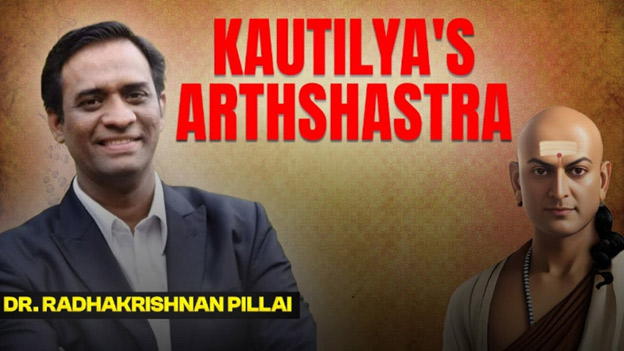The podcast episode titled “Dr Radhakrishnan Pillai on Kautilya’s Arthashastra, Saptang Model, Rajdharma & Chanakya Neeti” was hosted by Forum For Global Studies, a Delhi based multidisciplinary thinktank. Dr Sandeep Tripathi moderated the session and the talk featured Dr Radhakrishnan Pillai, an expert on Chanakya Neeti. The discussion focused on principles of Arthashastra and its contemporary relevance in global politics.
Dr Tripathi opened the discussion by quoting a verse from Arthashastra stating, “Praja sukhe sukham raja, prajanam tu hitey hitam” meaning “in the happiness of subjects lies the happiness of the king & in the welfare of public lies his welfare”. Dr. Tripathi introduced Dr. Pillai, a renowned expert in ancient Indian political philosophy and a distinguished professor at the University of Mumbai. Dr Tripathi began his remark by questioning whether Kautilya can be considered the Indian equivalent of Machiavelli. Dr Tripathi discussed the parallels often drawn between Kautilya’s Arthashastra and Machiavelli’s The Prince, highlighting their influence on political strategy and statecraft across different eras and cultures. Dr Pillai puts his argument by asserting the historical precedence of Chanakya, emphasizing that Chanakya’s existence predates Machiavelli, thus making direct comparisons between the two thinkers is inappropriate. Dr. Pillai emphasized the importance of learning from both Chanakya and Machiavelli, noting that Chanakya’s ideas are more encompassing and inclusive than Machiavelli’s.
The conversation then shifted to the dominance of Western narratives in shaping the understanding of strategic thought. Dr. Pillai highlighted the process by which narratives are crafted and then perceived by society, ultimately molding the reality we collectively experience. He illustrates this idea using the Indian Freedom Struggle, where intellectuals like Lokmanya Tilak, Subhash Chandra Bose, and others presented different narratives. He stressed the importance of research in constructing accurate narratives. Dr Pillai and Dr Tripathi further talk about the comparisons between Chanakya and Machiavelli, stating both had different theories relevant to their particular society. Dr Tripathi then talked about application of Arthashastra in modern day politics, citing “Mandala Theory”.
He questioned India’s reluctance in adopting Kautilya’s realism in India’s foreign affairs. Dr. Pillai mentioned that the priority during India’s early independence was nation-building rather than crafting a specific narrative, potentially leading to India lacking its distinct narrative. Dr Tripathi puts his opinion saying India now is in a stable position, capable of challenging the global narrative and building its own civilizational ethos. Furthermore, Dr Tripathi talked about the changing contours of modern warfare revolving around AI, cybersecurity, data analytics and questioned the relevance of Kautilya’s strategic thought and contemporary geopolitics. Addressing the question, Dr Pillai stated the interconnectedness of the world today and explained how problems in a remote corner of the world affects the entire global system. He further draws a synergy between Kautilya’s thought and its relevance not only in the political domain but also in the corporate sphere.
In his closing statement, Dr. Tripathi asserted that Kautilya’s ideology leans more towards realism than morality, a distinction often misunderstood by many. Additionally, Dr. Tripathi asked Dr. Pillai to share his inspiration for young scholars. Dr. Pillai concluded by noting that today’s youth have the advantage of technological connectivity. He emphasized the importance of students prioritizing reading, research, and constructing their own narratives.

